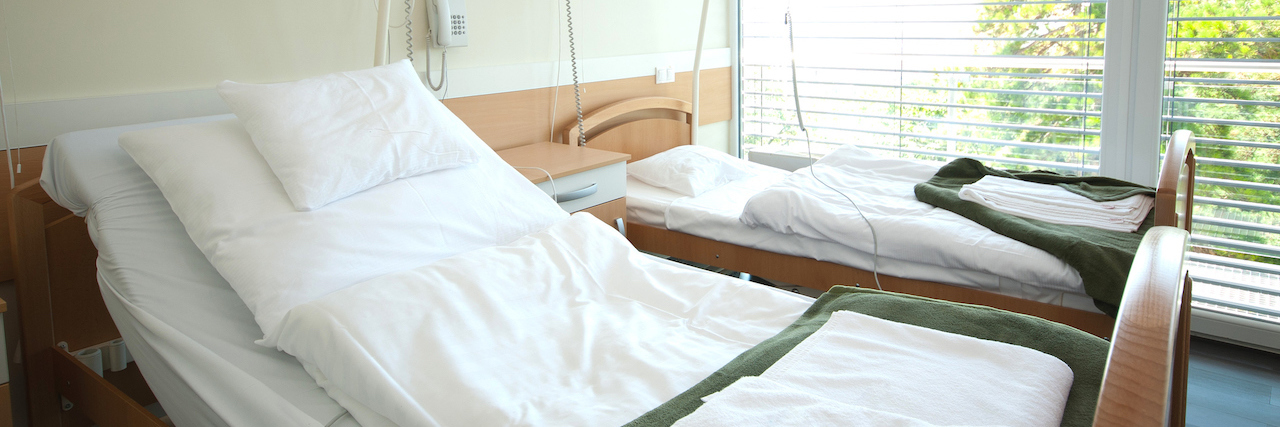Hospital Psych Unit Forced to Clear Out to Make Room for COVID-19 Patients
Editor's Note
Join The Mighty’s Coronavirus group to connect with other Mighties living through the pandemic. Read the latest updates, share helpful tips, or give and receive virtual support.
One Canada hospital was asked to clear out its psychiatric ward to make way for mental health patients with COVID-19 after three other units maxed out capacity. This provides further evidence that COVID-19 is lurking in inpatient psychiatric hospitals without adequate infection control procedures, putting vulnerable patients at risk.
On Friday, Montreal Gazette reported that Jewish General Hospital in Montreal was told to clear out its 48-bed psychiatric unit to make room for an overflow of COVID-19-positive mental health patients from two neighboring hospitals, Lakeshore General Hospital and Douglas Mental Health University Institute. A third hospital designated to treat psychiatric patients with COVID-19, Centre hospitalier de l’Université de Montréal (CHUM), was also maxed out, prompting the need for another location.
“What happened yesterday is that they reached their capacity for COVID-positive psychiatric patients at the other two institutions,” Dr. Lawrence Rosenberg, who oversees the area’s health authority, said. “We’re going to implement the plan to make the Jewish the third COVID-positive location for non-dangerous psychiatric patients.”
1) In another sign the #pandemic is spreading in unexpected ways, the Jewish General Hospital has been ordered to clear out its in-patient psychiatric ward for an influx of psychiatric patients infected with COVID-19. Please click on the story below. https://t.co/fz2HXVxKBh
— Aaron Derfel (@Aaron_Derfel) May 8, 2020
Patients from Jewish General Hospital who were already receiving treatment for their mental health were either sent home early or transferred to other behavioral health hospitals to make room. The Gazette previously reported that a source said the COVID-19 outbreaks in psychiatric wards were likely because health care providers needed to move between hospitals with active COVID-19 infections and those without. As a result, the highly contagious virus spread.
Other inpatient psychiatric wards across North America have put mental health patients and health care workers at risk for COVID-19 exposure. Angela Allen, BSN, RN-BC, a nurse at an inpatient psych unit in North Carolina, previously told The Mighty that in her hospital, mental health patients had to pass through the general emergency room before entering the psychiatric unit.
While hospital officials deemed these patients low-risk for COVID-19, they were exposed in the general emergency room before making their way to Allen’s unit, all without taking precautions like wearing a face mask. In addition, because of strict safety rules in locked psych units, patients didn’t have adequate access to hygiene products like soap.
“Where I work, psychiatric patients have to go through the medical department first to be cleared medically to come to us,” Allen said. “So everything’s coming from where the COVID or suspected COVID patients are going anyway.”
Inside the Terrifying World of Psychiatric Emergency Rooms During COVID-19
Posted by The Unmasked RN on Monday, April 20, 2020
Inpatient mental health care is already difficult for patients, and the COVID-19 pandemic has heightened mental illness symptoms for many people. An acute crisis adds challenges to safely delivering mental health treatment that reduces the risk of infection — those experiencing a psychotic episode, for example, may have trouble with physical distancing or reality-checking thoughts and voices.
“I have had some symptoms pop up like delusions,” Michelle Hammer, Mighty contributor and founder of Schizophrenic.NYC, told The Mighty. “Having so much time inside is letting me have more time to think to myself. I keep thinking of the past and coming up with new delusions. It’s hard to know what is real sometimes.”
In a letter published in Lancet Psychiatry, experts in China pointed out that psychiatric patients already face barriers to care, inpatient or outpatient, on top of an increased risk for COVID-19 infection.
“People with mental disorders can be exposed to more barriers in accessing timely health services, because of discrimination associated with mental ill-health in health-care settings,” the authors wrote, adding:
Many people with mental health disorders attend regular outpatient visits for evaluations and prescriptions. However, nationwide regulations on travel and quarantine have resulted in these regular visits becoming more difficult and impractical to attend.
The recent outbreak of COVID-19 in Montreal’s psychiatric units highlights the need to pay closer attention to mental health care during the pandemic, particularly for the most vulnerable patients. Allen emphasized that we need to start taking better precautions now to protect patients and health care workers to limit dangerous virus outbreaks now and prevent them in the future.
“There’s a very real chance that when this is over, everyone’s going to be so exhausted, and the economy, just everything that’s going to happen, that this gets swept under the rug,” Allen said. “That’s not acceptable. We can never have this happen again.”
Header image via Geribody/Getty Images

